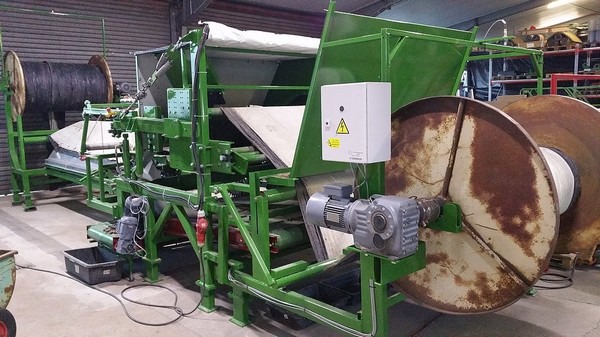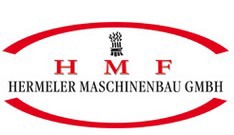For the Westphalian mechanical engineering company HMF-Hermeler, the year 2023 is marked by numerous innovations. In addition to the launch of the advanced SpaFo process, which is designed to make the recycling of asparagus film more efficient, more sustainable and - last but not least - more cost-effective, new technology for sorting leeks and an optimised version of the Leofant asparagus comb cutter will also be presented. In the meantime, the topic of cooling by means of cold water substitutes or two-substance circuit systems is also being pushed further, says Managing Director Thomas Hermeler in an interview.
On average, about 5,000 linear metres of film with a width of 1.4 metres are used per hectare. After harvesting, the films are rolled up and stored temporarily until they can be reused. As a rule, they remain in use for eight years and then have to be disposed of. Until now, recycling the asparagus films has been particularly time-consuming and costly, precisely because of the high proportion of sand in the film pockets.
Hermeler: "The sand inevitably has to come out of the bags in order to be able to recycle and sell them at all. Thanks to this machine, which we developed together with researchers from the ATB (Potsdam Leibniz Institute for Agricultural Engineering and Bioeconomy), it is now possible to open these foils and get the sand out. They can then be disposed of appropriately and fed back into the process so that new films can be made from them again afterwards."
 SpaFo demonstrator: machine for preparing plastic films for recycling / Photo: Geyer/ATB
SpaFo demonstrator: machine for preparing plastic films for recycling / Photo: Geyer/ATB
Reduction of disposal costs
The first system has already been sold and will be delivered in autumn. "Our patented system is attracting a lot of interest in the asparagus sector, not only in Germany but also in other classic growing countries such as the Netherlands," Hermeler describes and points out the high disposal costs. "The costs for the disposal of the asparagus film are high, because not only the asparagus film, but also the weighting material, such as sand, is charged. In some countries, disposal costs have now risen to 300-400 euros per tonne. Especially for larger asparagus farms, the annual disposal costs thus correspond to an amount in the high five-digit range. By getting the sand out with SpaFo, these costs can now be significantly reduced, which is why the investment should pay off after just a few years."
Highly automated leek sorting
Also new in the HMF Hermeler range is the leek sorting machine. This line is already being used commercially by one customer, says Hermeler. "Nowadays, you only want leeks that correspond to a certain bandwidth, i.e. a given diameter. So the goods have to be sorted accordingly. With our system, up to two employees can be saved per year. The employee no longer needs to count how many leeks he puts into the box. Another advantage is the integrated cleaning system with which the line is equipped." The system has a total capacity of up to 10,000 stems per hour, and in addition to leeks, the process can also be used for sorting carrots or bunch onions.
Furthermore, HMF recently launched an optimised version of the tried-and-tested Leofant asparagus ridger. The Leofant 56 system shovels the material upwards much better. The sophisticated design of the machine also reduces diesel consumption by up to 30 per cent, Hermeler says. In order to keep up with the trend towards sustainability and cost reduction, the mechanical engineering company has already been optimising its portfolio for several years, where possible. "In the area of cooling, we are trying to get away from the old refrigerants and instead rely on dual-material cycle systems based on cold water."
According to Hermeler, this strategy has several advantages. "Normal refrigerant gas was always distributed throughout the company via the pipelines. Now the gas only stays where the respective plant is actually located, which ultimately also significantly reduces consumption. This is a decisive factor, especially since the prices for refrigerant gas have multiplied in recent years. Especially in the cherry and blueberry sector, this system is already well received."
In this context, the industry supplier points to the more difficult framework conditions. "The switch to sustainable refrigeration systems is unfortunately only promoted in trade and less so in agriculture. What is otherwise causing us problems is the lack of farm adoption among many of our customers, which is at the expense of their willingness to invest. In this respect, the market will continue to clear in the coming years."
Further information:
Thomas Hermeler
HMF-Hermeler Maschinenbau GmbH
Lohmannstr. 4
48336 Füchtorf
Tel. +49 (0) 5426 5384
Fax: +49 (0) 5426 5385
info@hmf-hermeler.de
www.hmf-hermeler.de
